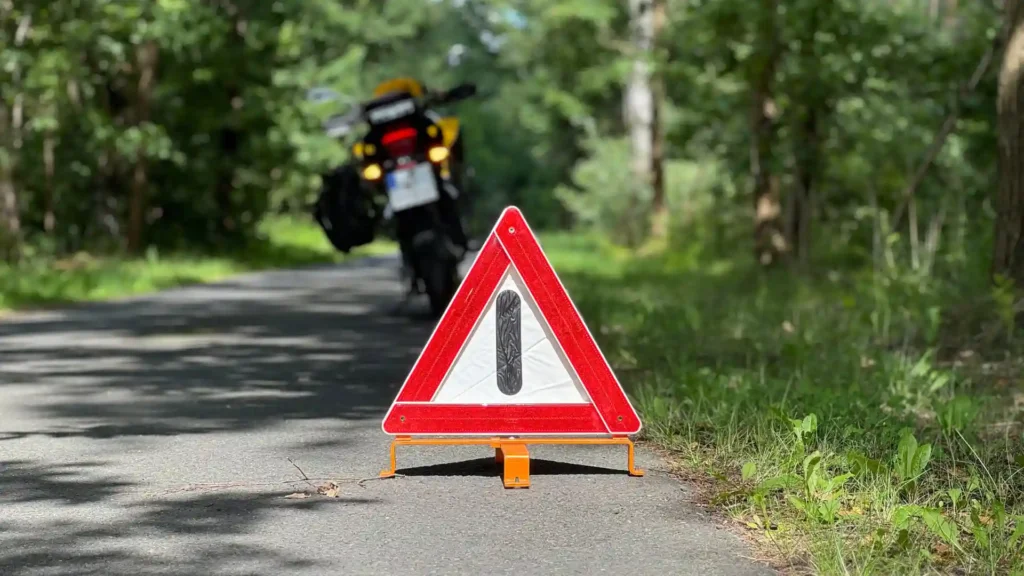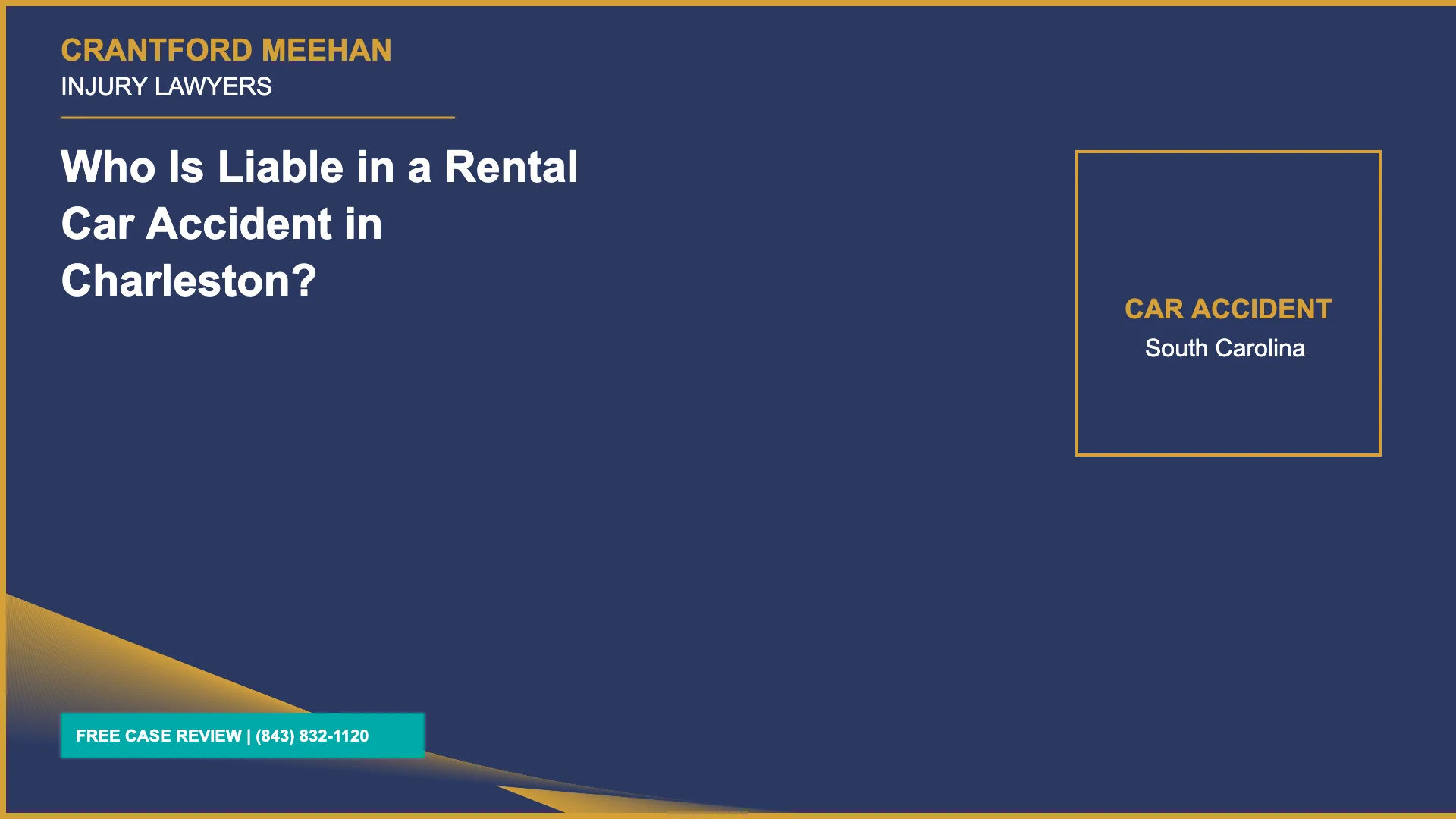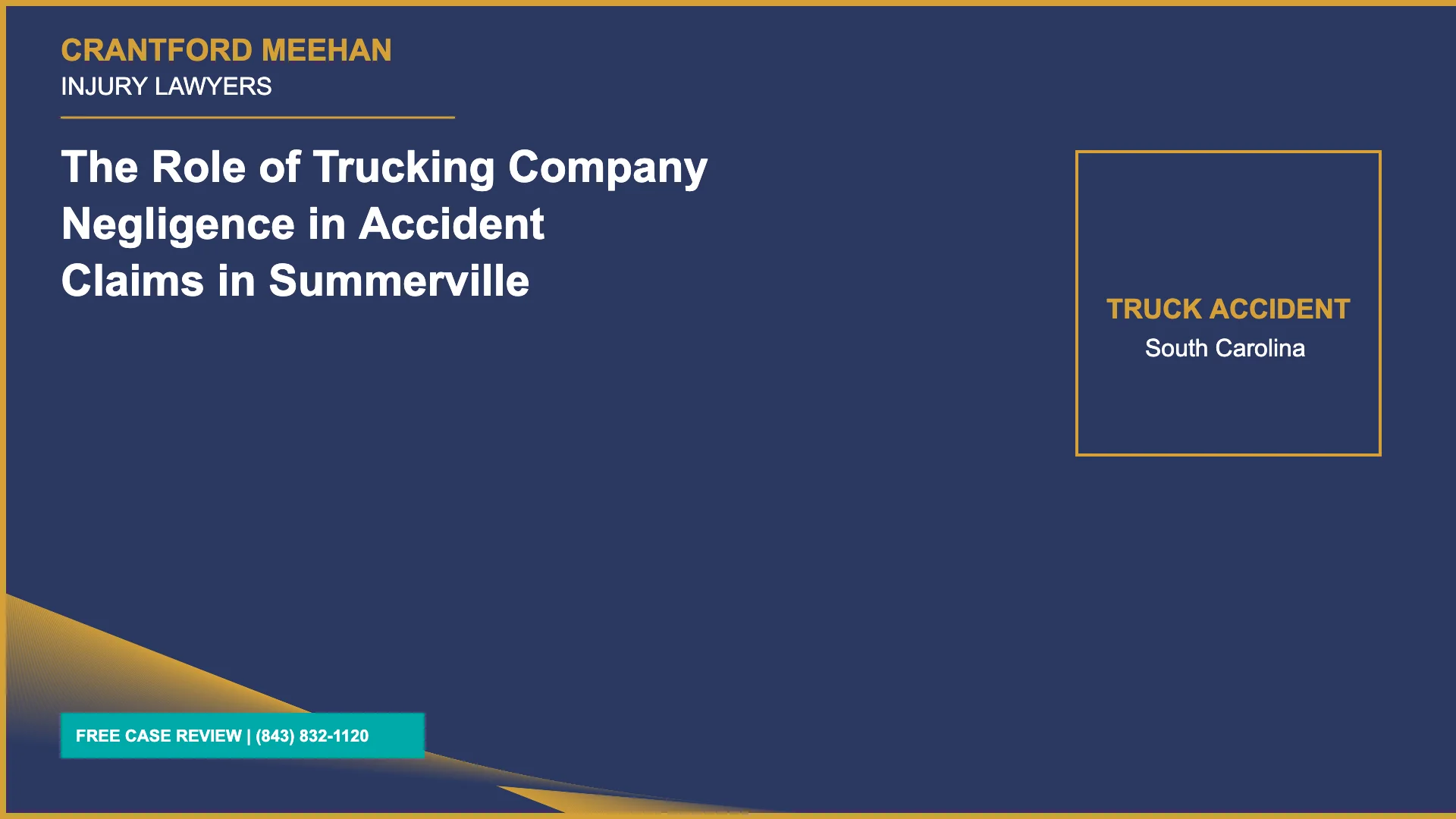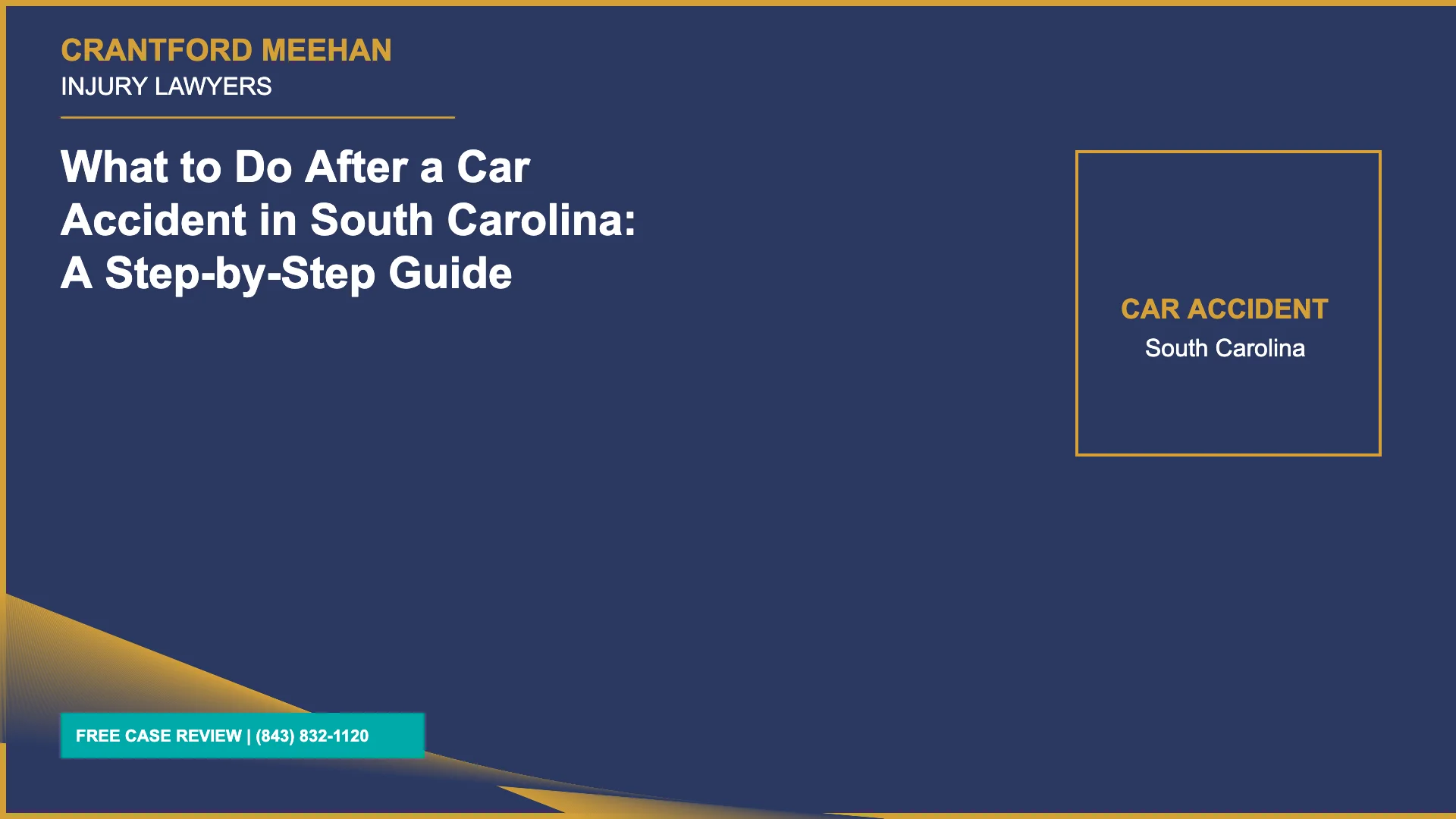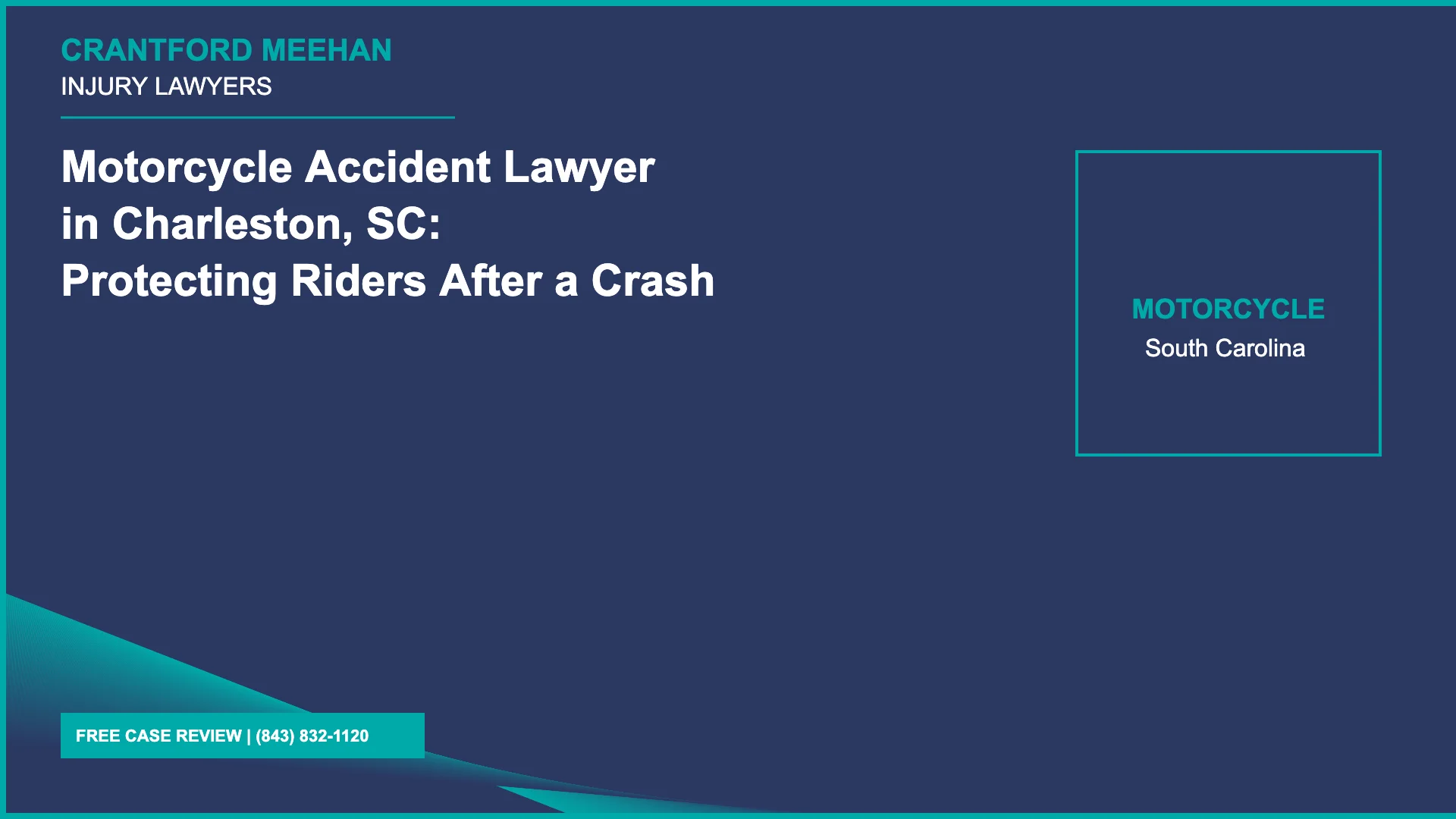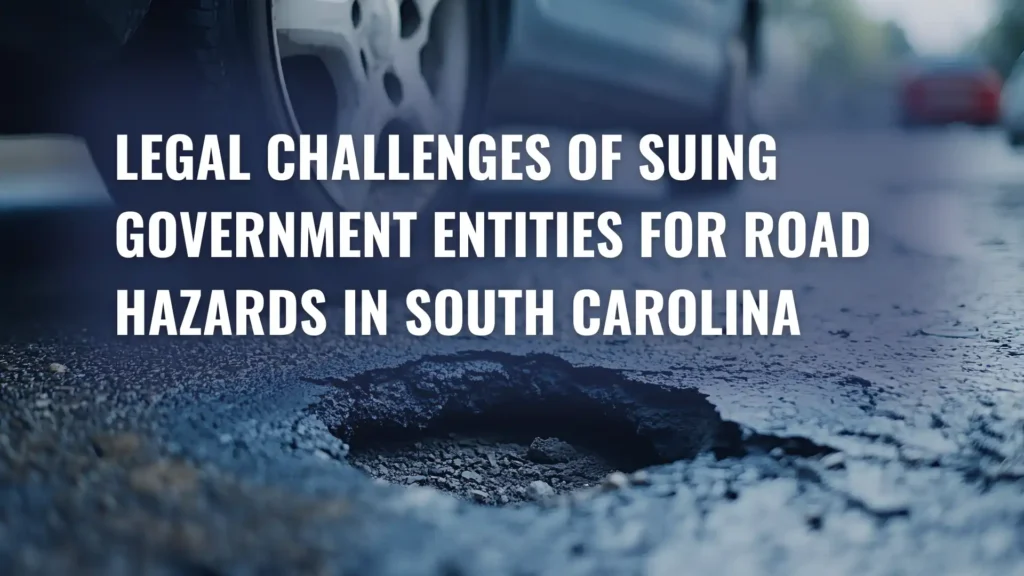
When a pothole damages your vehicle or a poorly maintained road causes an accident, you may want to sue the government entity responsible. However, suing the government for a road hazard in South Carolina involves different rules than standard personal injury claims. Understanding these legal challenges is essential before pursuing compensation for injuries or damages caused by road hazards.
Understanding Government Immunity in South Carolina
The primary obstacle to suing government entities for road hazards stems from a legal doctrine called sovereign immunity. This principle protects government agencies from lawsuits unless they explicitly waive that protection through legislation.
Sovereign immunity exists because the law traditionally holds that “the king can do no wrong.” While this doctrine originated centuries ago, South Carolina courts continue to apply it to government entities today. This means that government agencies—whether state, county, or municipal—enjoy broad protection from liability that private property owners and businesses do not receive.
However, South Carolina recognizes that absolute immunity would leave injured citizens without recourse. The state legislature created an important exception through the South Carolina Tort Claims Act. This act allows residents to pursue claims against government entities under specific circumstances. Understanding when this exception applies determines whether you can recover compensation for road hazard injuries.
The South Carolina Tort Claims Act: Your Path to Recovery
The South Carolina Tort Claims Act (S.C. Code Ann. § 15-78-10 et seq.) represents the primary mechanism for holding government entities accountable for negligence. This act waives sovereign immunity in limited situations, allowing injured parties to recover damages when government negligence causes harm.
Under the Tort Claims Act, government entities become liable for negligence in the same manner as private individuals or businesses. You must prove that the government entity owed you a duty of care, breached that duty, and caused damages through that breach. The act applies to road maintenance claims, making it possible to recover compensation for injuries sustained due to dangerous road conditions.
The Tort Claims Act establishes specific procedural requirements that differ from standard personal injury lawsuits. These requirements exist to give government entities notice of claims and an opportunity to investigate before litigation begins. Failing to follow these procedures can result in dismissal of your claim, regardless of the strength of your underlying case.
One critical distinction involves the types of claims covered. The Tort Claims Act applies to negligent acts but excludes claims based on discretionary governmental functions. This distinction becomes important in road maintenance cases. Courts sometimes classify decisions about which roads to repair as discretionary functions immune from liability.
Common Road Hazards That May Create Government Liability
Several types of road hazards may establish government liability under South Carolina law. Identifying which hazards create actionable claims requires understanding how courts evaluate government responsibility for road conditions.
Potholes represent one of the most common road hazards leading to injury claims. When a pothole causes a vehicle to swerve, strike another vehicle, or overturn, the government entity responsible for road maintenance may face liability. However, the government must have had actual or constructive knowledge of the pothole’s existence. This means either the government knew about the pothole, or it existed for a sufficient time that the government should have discovered it through reasonable inspection.
Inadequate road maintenance creates liability when the government fails to repair deteriorating road surfaces, failed asphalt, or crumbling shoulders. If a road’s poor condition directly causes an accident, and the government knew or should have known about the condition, liability may attach. Road defects are a common basis for car accident claims in South Carolina.
Dangerous road conditions resulting from weather events present more complex liability questions. While government entities cannot prevent rain, snow, or ice, they may face liability for failing to treat roads or provide adequate warnings when hazardous conditions develop. The government’s response time and the foreseeability of the hazard influence whether liability exists.
Lack of proper signage or warnings can establish government liability when road hazards exist. Injured parties may recover damages if a road contains a dangerous condition—such as a sharp curve, sudden drop-off, or debris—and the government fails to post appropriate warnings.
Failed drainage systems causing accidents represent another category of actionable road hazards. When inadequate drainage creates standing water, flooding, or hydroplaning conditions, and the government failed to maintain the drainage system, liability may exist.
The Notice Requirement: A Critical First Step
Before filing a lawsuit against a government entity for road hazards, South Carolina law requires you to file a written notice of claim. This requirement distinguishes government entity claims from standard personal injury lawsuits and represents a critical procedural step.
The notice requirement serves important purposes. It provides the government entity with timely information about the claim, allowing investigation while evidence remains fresh. It also creates an opportunity for settlement discussions before litigation becomes necessary. Failure to comply with notice requirements typically results in dismissal of your claim.
South Carolina law requires that notice be filed within a specific timeframe. Generally, you must provide written notice within one year of the date your cause of action arose—meaning one year from the date of the accident or injury. This timeline differs from the standard personal injury statute of limitations, making prompt action essential.
Important procedural detail: After you file notice, the government entity has 180 days to accept or deny your claim. If the government entity fails to respond within this 180-day period, the claim is considered denied. You cannot file a lawsuit until after this 180-day waiting period expires.
Additionally, the statute of limitations for filing a lawsuit is two years from the date of injury under the South Carolina Tort Claims Act. However, if you timely file a verified claim within the one-year notice period, the statute of limitations extends to three years from the date of injury.
The notice must contain specific information to be effective. Include the date, time, and location of the accident; a detailed description of the road hazard that caused the injury; identification of the government entity responsible for the road; a description of your injuries and damages; and your contact information. The more detailed and specific your notice, the better it serves its purpose.
You must deliver the notice to the appropriate government entity. For state roads, notice goes to the South Carolina Department of Transportation. For county roads, notice goes to the county government, and for municipal roads, notice goes to the city or town government. Sending notice to the wrong entity may not satisfy the statutory requirement.
Missing the notice deadline has serious consequences. Courts typically dismiss claims filed without proper notice, even if the underlying facts would otherwise support recovery. This means that even if you have a strong case, procedural failure can prevent you from pursuing compensation.
Proving Negligence Against Government Entities
Successfully suing a government entity for road hazards requires proving negligence through the same elements applicable to private parties. However, the burden of proof and evidentiary requirements may differ in government entity cases.
To establish negligence, you must prove four elements: the government entity owed you a duty of care; the entity breached that duty; the breach caused your injuries; and you suffered damages. Each element requires specific evidence and proof.
The duty of care element typically presents no difficulty in road hazard cases. Government entities clearly owe a duty to maintain roads in reasonably safe condition and to warn of known hazards. Courts recognize this duty as fundamental to the government’s responsibility for public infrastructure.
Proving breach of duty requires demonstrating that the government entity failed to maintain the road or failed to warn of a known hazard. This might involve showing that the road condition fell below acceptable maintenance standards, or that the government knew of the hazard but took no action.
Causation requires proving that the road hazard directly caused your accident and injuries. This element often involves expert testimony about road conditions, accident reconstruction, or engineering standards.
Important note on burden of proof: In some circumstances under the South Carolina Tort Claims Act, you may need to prove gross negligence rather than simple negligence to overcome governmental immunity. The specific burden of proof depends on the nature of the claim and the type of government entity involved. Consult an experienced South Carolina personal injury attorney to understand the applicable standard for your case.
Documentation strengthens your negligence claim significantly. Photographs of the road hazard taken immediately after the accident provide robust evidence. Medical records documenting your injuries establish the connection between the accident and your damages. Witness statements corroborate your account of the accident.
Prior complaints about the same road hazard strengthen your claim considerably. If other individuals reported the risk to the government entity before your accident, this demonstrates that the government knew or should have known about the condition. Public records requests can often uncover such prior complaints.
Damages Available in Government Entity Claims
Understanding the damages available in government entity claims helps you evaluate whether pursuing a claim makes financial sense. South Carolina law limits certain damages in government entity cases, distinguishing them from standard personal injury claims.
Medical expenses represent a primary category of recoverable damages. This includes hospital bills, surgical costs, emergency room treatment, rehabilitation expenses, and ongoing medical care necessitated by your injuries. You can recover both past medical expenses and reasonable anticipated future medical costs.
Lost wages constitute another significant damage category. If your injuries prevent you from working, you can recover compensation for income lost during your recovery period. This includes both temporary disability and, in cases of permanent injury, lost earning capacity.
Pain and suffering damages compensate you for physical pain, emotional distress, and reduced quality of life resulting from your injuries. However, South Carolina caps damages in government entity claims. Under the South Carolina Tort Claims Act, the total recovery against any single government entity is limited to $600,000 per occurrence. This cap applies regardless of the number of injured parties or the severity of injuries. If multiple people are injured in the same incident, the $600,000 cap is divided among all claimants.
Property damage recovery covers vehicle repairs or replacement if a road hazard damages your vehicle. This includes the cost of the repair or, if the repair is uneconomical, the fair market value of the vehicle.
These damage caps represent a significant limitation compared to standard personal injury claims, where no such caps typically apply. Understanding these limitations helps you assess whether pursuing a government entity claim aligns with your circumstances.
Why You Need an Experienced Attorney
The complexity of claims made by government entities makes legal representation essential. An attorney experienced in South Carolina government liability cases understands the procedural requirements, substantive law, and strategic considerations determining claim success.
Government immunity laws create a specialized legal environment that differs substantially from standard personal injury practice. An attorney familiar with these laws knows which arguments courts find persuasive and which procedural steps are non-negotiable. This knowledge prevents costly mistakes that could derail your claim.
Procedural requirements in cases of government entities are strict and unforgiving. Missing the notice deadline, filing notice with the wrong entity, or failing to include required information can result in claim dismissal. An experienced attorney ensures compliance with every procedural requirement.
Negotiating with government insurers requires different strategies than dealing with private insurance companies. Government entities often employ specialized claims adjusters and attorneys familiar with damage caps and immunity defenses. An attorney experienced in these negotiations understands how to present your claim effectively and achieve a fair settlement.
Crantford Meehan brings experience handling road hazard claims and personal injury claims throughout South Carolina. The firm’s attorneys have recovered millions in settlements and judgments for injured clients, including recoveries in vehicle accident cases. Both partners hold AV Preeminent ratings from Martindale-Hubbell, reflecting peer recognition of legal ability and ethical standards. The firm’s trial experience and accessibility ensure clients receive dedicated representation focused on achieving strong results.
Next Steps: How to Protect Your Rights
If you have been injured by a road hazard in South Carolina, taking prompt action protects your legal rights and strengthens your potential claim.
Immediately after a road hazard accident, document everything. Take photographs of the road condition that caused the accident, including wide shots showing the hazard’s location and close-ups showing the specific defect. Photograph your vehicle damage and any visible injuries. If possible, obtain contact information from witnesses who saw the accident or the road condition.
Seek medical attention promptly, even if your injuries seem minor. Some injuries develop or worsen over time, and prompt medical documentation establishes the connection between the accident and your injuries. Keep all medical records, bills, and receipts related to your treatment.
Gather documentation supporting your claim. Obtain a police report if law enforcement responded to the accident. Collect medical records and bills. Document lost wages through pay stubs or employer statements. Preserve any communications with the government entity about the road condition.
Consult with a personal injury attorney experienced in government entity claims as soon as possible. An attorney can evaluate your claim, explain your legal options, and ensure you meet all procedural requirements. Most personal injury attorneys work on contingency, meaning you pay no upfront fees.
File your notice of claim within the required timeframe. Your attorney will prepare and file the notice with the appropriate government entity, ensuring it contains all required information and reaches the correct recipient.
Your attorney will then negotiate with the government entity’s insurance carrier, presenting evidence of negligence and damages. Many claims settle during this negotiation phase. If settlement negotiations fail, your attorney can file a lawsuit and pursue your claim through the court system.
Frequently Asked Questions
Can I sue the government for a pothole accident in South Carolina?
Yes, you can sue the government for a pothole accident under the South Carolina Tort Claims Act, but you must follow specific procedures. You must file a written notice of your claim within one year of the accident, and you must prove that the government entity knew or should have known about the pothole and failed to repair it.
What is the time limit for filing a claim against a government entity?
You must file a written notice of your claim within one year of the date your cause of action arose. However, you have two years from the date of injury to file a lawsuit under the South Carolina Tort Claims Act. If you timely file a verified claim within the one-year notice period, the statute of limitations extends to three years from the date of injury. Missing the one-year notice deadline typically results in claim dismissal.
Does sovereign immunity prevent all lawsuits against the government?
No. The South Carolina Tort Claims Act creates exceptions to sovereign immunity, allowing lawsuits for negligence in road maintenance and other areas. However, immunity still applies to discretionary governmental functions and certain other categories of claims.
What information should I include in my notice of claim?
Your notice should include the date, time, and location of the accident; a detailed description of the road hazard; identification of the responsible government entity; a description of your injuries and damages; and your contact information. The more specific and detailed your notice, the better.
How much can I recover from a claim from a government entity?
Damages vary based on your specific injuries and losses. However, South Carolina law caps total recovery against a single government entity at $600,000 per occurrence. This cap applies regardless of the number of injured parties or the severity of injuries.
What evidence do I need to prove the government was negligent?
You need evidence showing the government entity knew or should have known about the road hazard, failed to repair or warn about it, and this failure caused your accident and injuries. Photographs of the hazard, medical records, witness statements, and evidence of prior complaints all strengthen your claim.
How long does a government entity claim take to resolve?
Timeline varies significantly. Some claims settle within months during negotiation. Others require litigation and may take one to three years or longer to resolve. Your attorney can provide a more specific timeline based on your claim’s circumstances.
Contact Crantford Meehan for a Free Consultation
If you have been injured by a road hazard in South Carolina, Crantford Meehan can help. The firm offers free consultations to evaluate your claim and explain your legal options. With offices in Charleston, Summerville, and Florence, Crantford Meehan serves injured clients throughout South Carolina. Contact Crantford Meehan today at (843) 832-1120 or visit the firm’s website to schedule your free consultation. The firm handles personal injury claims on a contingency fee basis, meaning you pay no upfront fees and only pay if the firm recovers compensation for you.
NATIONALLY RECOGNIZED LAW FIRM
REQUEST YOUR FREE CONSULTATION
GET THE HELP YOU NEED
Fill out the form below to get in touch with us!

